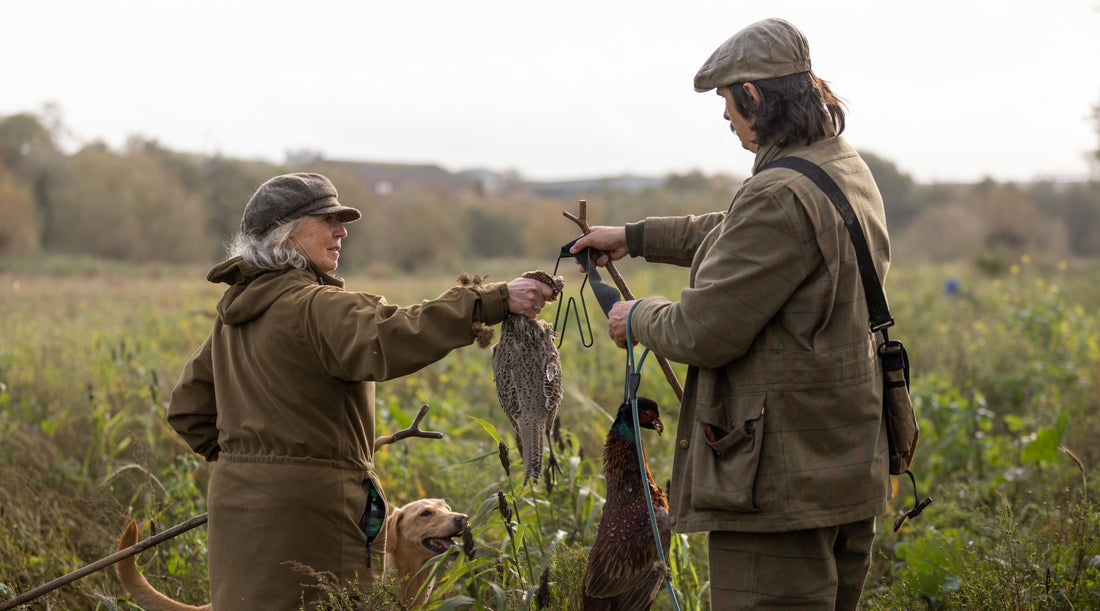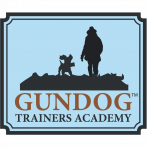
The Pheasant Diaries: How Co-Founder Helen and her husband Chris Phillips Rear Pheasants for Clicker Gundog Training Shoots
Share
Unless you’re a gamekeeper or actively involved in a small syndicate shoot, rearing pheasants might not be something you’ve given much thought to as a gundog owner.
It’s one of those behind-the-scenes roles that many gundog trainers don’t explore in detail with their students. At The Gundog Trainers Academy, however, it’s a vital part of what we teach, thanks to our partnership with the Clicker Gundog training shoot, which is owned and run by GTA co-founder Helen Phillips and her husband Chris.
Rearing pheasants is a year-round endeavour that enables us to create realistic, carefully managed training opportunities for gundogs and their handlers. On module four of all our in-person Handler and Enhanced Handler courses, students participate in a live game training day which is integral to helping them and their dogs build field skills in a supportive, pressure-free environment.
In the Pheasant Diaries video series, Chris Phillips, the gamekeeper at Clicker Gundog, takes you behind the scenes to showcase the highs and lows of the rearing process. From preparing pens and planting cover crops to managing predators and teaching young birds to roost, these videos provide an honest, detailed look at what goes into raising birds ethically and effectively.
This blog will guide you through the key aspects of pheasant rearing: why Chris and Helen do it, the challenges involved, and how pheasants can also provide a sustainable, healthy source of protein. At the end, you’ll find the full 2024 Pheasant Diaries film - a compilation of the videos shared in the Clicker Gundog private Facebook community from July to October.

Why Clicker Gundog Rear Pheasants
For Helen and Chris Phillips at Clicker Gundog, rearing pheasants is a vital part of creating a world-class training environment for gundogs. These birds allow us to provide in-person students of the Gundog Trainers Academy with realistic, controlled scenarios essential for teaching and refining key fieldwork skills.
The pheasants play a central role in the live game training days offered as part of our in-person courses such as the Handler’s Course, Enhanced Handler’s Course and Graduate Handler's Course.
These days are held at the Clicker Gundog training shoot, which has been specifically designed and managed by Helen, the co-founder of the GTA, and her husband Chris, the gamekeeper, to create a safe and supportive space for both dogs and handlers to develop their skills.
Training with live birds is invaluable, particularly for handlers preparing their dogs for the shooting season. While dummies and launchers are excellent tools, they often fall short of replicating the complexities of live game for high-drive gundogs.
With access to Clicker Gundog’s birds, we can carefully plan exercises that mirror real-life shooting scenarios, setting dogs up for success in a controlled and relaxed environment.
The final module of our in-person Handler's courses includes an opportunity to participate in live game training days, where students and their dogs can take part in beating or picking up, depending on the breed and their goals.
These training sessions are run as mini-shoots, incorporating rough shooting, walk-ups, and beating, to simulate real shoot-day conditions.
These sessions are not just for handlers to test their dogs’ abilities. They’re also a chance to put theory into practice in an educational and supportive setting.
For accredited instructors looking to become accredited on game (GTA) as well as on dummies (GTA-Ad) our Graduate Handler's Course live game days also provide opportunities to develop teaching skills, ensuring they are well-equipped to coach clients in both beating and picking up scenarios.
For both handlers and dogs, live game training days are invaluable for honing hunting ability, improving control, and mastering general field skills. Whether the goal is preparing for formal shoots, competitions, or professional instruction, every activity is designed to build confidence, cement the bond between dog and handler, and celebrate the journey of ethical gundog training.

An Overview of Rearing Pheasants
Rearing pheasants is a year-round commitment, requiring meticulous planning, close attention to detail, and a thorough understanding of the birds’ needs.
This process is overseen by gamekeeper Chris Phillips (husband of GTA co-founder Helen) whose responsibilities, as featured in the Pheasant Diaries video series, start long before the birds arrive.
Preparing the pens involves a range of tasks, from clearing brambles and strimming vegetation to repairing fences and setting up watering stations. This essential groundwork ensures the pens are secure and provide the right shelter and resources for the pheasants to thrive when they settle in.
Once the poults arrive, the focus shifts to keeping them safe, well-fed, and watered.
A key part of Chris’ role during this time is “dogging in,” which involves gently guiding birds back toward the pens when they wander too far. His trusty dogs, Jack, Wren, Dibble and Teal, play an integral role, assisting Chris by carefully encouraging the pheasants to return to the safety of their enclosures.
Over the following months, Chris’ responsibilities remain varied and demanding. From maintaining cover crops to safeguarding the birds from predators and managing risks such as disease, his vigilance ensures the pheasants stay healthy and well-prepared for their eventual role in training shoots.
Every detail matters, from the choice of feeders to the timing of evening walks, all contributing to the pheasants’ well-being and readiness for their important part in developing gundogs’ field skills.

The Challenges of Rearing Pheasants
Rearing pheasants isn’t for the faint-hearted. As highlighted in the Pheasant Diaries series, gamekeeper Chris faces a host of challenges throughout the year.
One of the most unpredictable hurdles is the weather. From wet winters that delay the planting of cover crops to scorching summer heat waves that demand constant attention to water stations, every year brings new conditions to navigate. Poor weather early in the season can hinder crop growth, limiting the cover available for the birds later on. Meanwhile, hot days require extra vigilance to ensure the pheasants stay hydrated and healthy.
Predators are another ongoing concern. Foxes, birds of prey, and other wildlife pose significant threats, particularly in the early stages when the young pheasants are less adept at roosting safely. To minimise losses, Chris employs a combination of secure fencing, habitat management, and regular patrols. Despite these efforts, the risk remains ever-present.
Keeping the pheasants within the safety of the pen during their first weeks is a particularly demanding task. As seen in the Pheasant Diaries, Chris spends hours “dogging in,” guiding wandering birds back to the pen. This becomes even more challenging as the pheasants grow curious and begin exploring their surroundings. Without this crucial guidance, birds that stray too far may become disoriented or vulnerable to predators.
Disease prevention is another critical aspect of rearing pheasants. Birds living in close quarters can quickly spread illnesses if preventive measures aren’t taken. Chris’ routine includes thorough cleaning of feeders and water stations, keeping a close eye on the flock for signs of disease, and ensuring the birds have enough space to reduce stress and maintain their health.
Despite these challenges, Chris’ dedication remains unwavering. Whether it’s repairing a broken fence as the sun sets or responding promptly to signs of a predator attack, every effort goes toward ensuring the safety and well-being of the birds.
Rearing pheasants is undoubtedly hard work, but this commitment lays the foundation for successful, ethical training shoots that reflect our values at The Gundog Trainers Academy.

Putting Pheasants on the Table
At The Gundog Trainers Academy, rearing pheasants isn’t just about creating effective training opportunities - it’s also about embracing a sustainable source of protein. These birds provide a fantastic alternative to commercially farmed meats, offering high nutritional value with a much smaller environmental footprint.
Pheasant meat is naturally lean, high in protein, and packed with essential vitamins and minerals. Compared to mass-produced poultry or processed meats, pheasant is a healthier and more ethical option, making it an excellent choice for those who value sustainability and quality.
Wild or ethically reared pheasants require significantly fewer resources than factory-farmed livestock. Their diet is sourced naturally from their environment rather than relying on processed feeds, further reducing their impact. For anyone conscious about sustainability, incorporating pheasant into your meals is a meaningful step toward eating more responsibly.
If you’ve never cooked with pheasant before, it’s easier than you might think! A simple way to get started is to use pheasant in place of chicken in your favourite recipes. It’s a versatile ingredient that works beautifully in curries, pies, stir-fries, and more. For additional inspiration, organisations like BASC offer a wealth of recipes through resources such as the Eat Game website, which is full of delicious ideas.
For handlers attending the shoot over days on the last module of our in-person courses, the opportunity to take home freshly shot pheasant is a way to connect with the full cycle of the experience.
It’s not just about training but about appreciating the value of these birds and transforming them into wholesome, nourishing meals that honour the work involved in raising them.

The 2024 Pheasant Diaries
The Pheasant Diaries video series offers The Gundog Trainers Academy community an exclusive, behind-the-scenes look at the dedication and effort involved in rearing pheasants for training shoots.
From preparing the pens and welcoming the poults to managing daily challenges and celebrating triumphs, gamekeeper Chris has shared the entire process in an educational and engaging way.
We’ve now compiled all the footage into a 45-minute film, taking you on a full journey through the 2024 pheasant-rearing season. Whether you’re curious about the meticulous preparation that goes into rearing pheasants or want to see Chris and his loyal dogs in action, this film is packed with valuable insights and heartwarming moments.
The film showcases the real-world challenges of pheasant rearing, from protecting the birds against predators to balancing their natural behaviours with the needs of a training shoot. It also highlights the integral role of working dogs, demonstrating how Chris and his dogs work together to create a safe and well-managed environment.
Importantly, the film doesn’t shy away from the realities of gamekeeping. It’s a testament to the care and dedication required to rear pheasants ethically and effectively, prioritising the welfare of the birds and the surrounding ecosystem every step of the way.
Scroll down to watch the full video below…
📸 Photograph credit Alice Loder Photography
